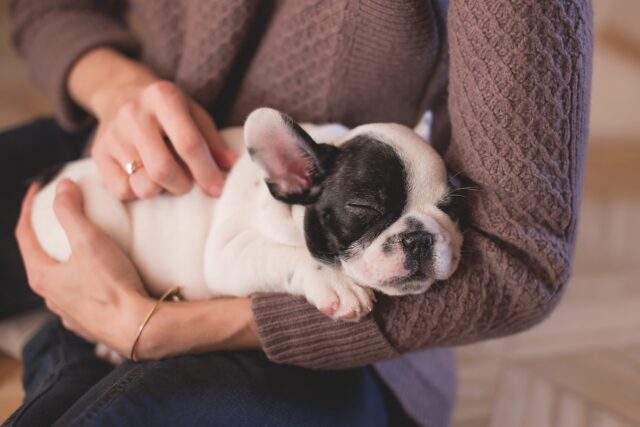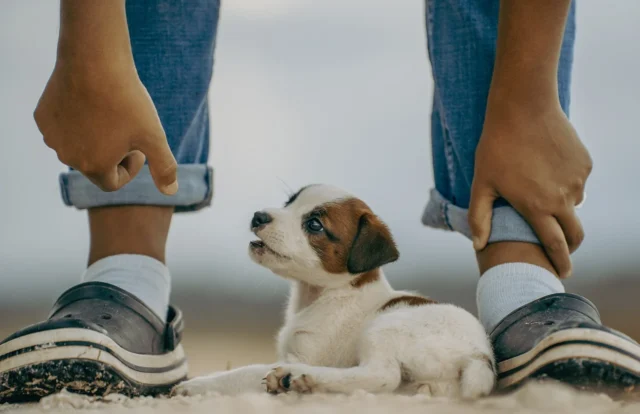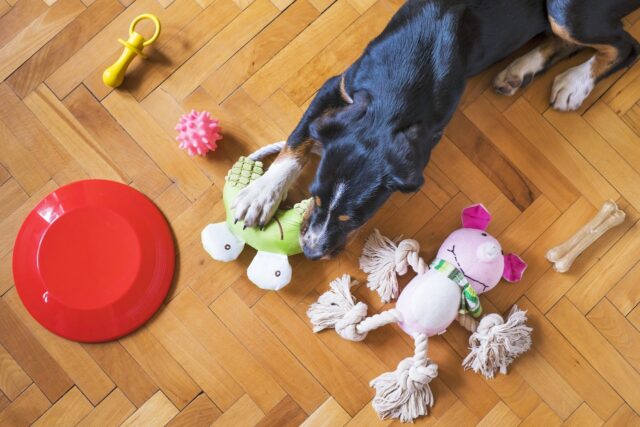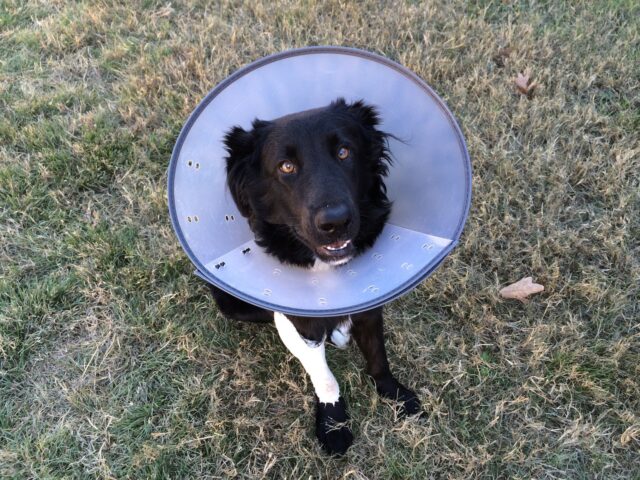If you’re scrolling through social media or driving past a dog park, you may wonder if it’s time to get a puppy. The decision to welcome a furry companion into your life is multifaceted and requires thoughtful consideration. Veterinarians, dog breeders, and pet experts all emphasize the importance of timing when bringing home a new puppy.
Deciding whether you’re ready for a puppy means you’ve researched and know what kind of dog is right for you. It also means that if you have children or plan to have them, you must consider them when choosing a puppy.
You are the only person who can answer, “Am I ready to have a puppy?” Before buying or adopting a puppy, examine your lifestyle and personality and look at all the factors, like being a parent, having a full-time job, and finances.
It’s essential to plan when and how your new puppy will enter your life and realize all the responsibilities of a new puppy. You’ll need to prepare your home and family for your new puppy to smooth the transition. If you don’t own your home, you should also speak to your landlord before getting a new puppy.
Here’s the takeaway:
Are You Ready for a Puppy?
The saying that “dogs are a man’s (or woman’s) best friend” resonates deeply because it encapsulates dogs’ invaluable role in enriching our lives, fostering meaningful connections, and exemplifying the purest form of companionship.
” Consider any factors that might mean a dog is not a good choice for everyone in the household, such as allergies or difficulties tolerating normal dog behavior, ” says the American Veterinary Medical Association. (AVMA). The AVMA advises against getting pups on impulse or as gifts.”Take time, involve your family.”
Who Will Care for Your Puppy?
Before you search for your puppy, you should ask yourself the most crucial question: ” Is a puppy right for me now?”
Sharing your home with a new puppy is a life-changing experience. Your new puppy will allow for a new friendship and a daily, long-term commitment through scheduled meal times, exercise schedules, playtime, veterinary care, grooming, positive training, and pet product shopping.
The American Kennel Club (AKC) says that considering energy requirements ensures that your dog will fit into your lifestyle. ” Heavy-coated dogs will require more regular grooming at home, as well as by a professional, which is both a time and financial commitment to consider, ” says the AKC.
Does a Puppy Fit Into Your Lifestyle?
We all love puppies and dogs. They’re always happy to see us, lower our heart rate, and are willing to play a quick game of fetch. While living with a puppy or adult dog has plenty of benefits, it may also reduce your time away from home or travel time.
Puppies need to be walked and fed around the same time each day, so going to the gym right after work may be difficult. Veterinary expenses can be costly if there are emergencies.
While there are numerous pet-friendly vacation options available for those who prefer to travel with their four-legged companions, there are times when leaving your puppy in the capable hands of a trusted caretaker or boarding facility is the best choice. Consider what you’re unwilling to sacrifice and who’s there to help you with the day-to-day care.
The Right Time to Get a Puppy
Your life stage also determines the right time to get a puppy. Perhaps you’re a student or a busy parent with young children. Looking at your new puppy as a new friendship requiring plenty of nurturing, training, and one-on-one quality time is essential. Are you ready for this?
Who Will Care for Your Puppy?
As a pet parent, you’ll be ultimately responsible for your pup’s shelter, food, companionship, physical and mental health, and exercise. The AVMA says that while families should involve their children in caring for a pet, youngsters need the help of an adult.
What Kind of Puppy is Right for You?
When it comes to size, small dog breeds do well in any housing, but breed traits in Shetland Sheepdogs, like excessive barking or being overly active, make them unsuitable for apartment living.
Large breeds like the Newfoundland and Saint Bernard become mellow once they become adults. That said, some giant breeds tend to drool, and since they’re giant breeds, they will also have significant dog breed needs.
Many breeds do well in single-family homes with a small backyard or garden. These include the following breeds:
- Golden Retrievers
- Labrador Retrievers
- Boxer
- Great Dane
- Irish Wolfhound
- Mastiff
Puppy Proof Your Home
Puppy-proofing your home is a crucial step in preparing for the arrival of a new furry family member. Just as you would childproof a home for the safety of a toddler, taking measures to create a secure and nurturing environment for a puppy is essential. Here are some critical considerations for puppy proofing:
- Remove Hazards: Identify and remove potential hazards such as small objects, electrical cords, toxic plants, and household chemicals that could put your puppy at risk.
- Secure Spaces: Block off or secure areas your puppy should not have access to, such as stairs, balconies, or rooms with delicate or hazardous items.
- Invest in Chew-Proofing: Puppies love to explore the world with their mouths, so ensure that valuable or dangerous items are kept out of reach. Invest in durable, chew-proof storage solutions for shoes, electronics, and other items.
- Protect Cables and Wires: Use cable protectors or conceal cables to prevent your puppy from chewing on them, which could lead to electric shocks or damage to electronic devices.
- Evaluate Living Areas: Assess your living areas from your puppy’s perspective. Look for spaces where they could get stuck or injured, like gaps between furniture or sharp corners.
- Safety Gates and Crates: Consider using safety gates to restrict access to certain areas and crates for safe confinement when close supervision isn’t possible.
Stock Up on Grooming & Puppy Supplies
You’ll need plenty of dog supplies during puppyhood and throughout your dog’s life. Stocking up on grooming and puppy supplies is an essential part of preparing for the arrival of a new puppy. Here’s the takeaway:
Grooming Essentials
- Brushes and Combs: Different breeds require different grooming tools, so select brushes and combs suitable for your puppy’s coat type.
- Shampoo and Conditioner: Choose gentle, puppy-specific grooming products to keep their coat clean and healthy.
- Nail Clippers: Invest in high-quality, appropriately sized nail clippers to keep your puppy’s nails trimmed.
- Health and Wellness
- Puppy Food: Select high-quality puppy food appropriate for your puppy’s age, size, and breed.
- Food and Water Bowls: Opt for durable, non-tip bowls that are easy to clean.
- Collar and Leash: Choose a lightweight, adjustable collar and a secure, comfortable leash for walks.
- Comfort and Safety
- Bedding: Provide a cozy, washable dog bed for your puppy to rest and sleep.
- Crates and Playpens: Consider getting a crate and/or playpen for training and safe confinement when needed.
- Toys: Offer a variety of safe, age-appropriate toys to keep your puppy entertained and mentally stimulated.
- Training and Cleanup
- Puppy Pads or Litter Box: If you’re training your puppy indoors, stock up on puppy pads or a litter box.
- Cleaning Supplies: Have pet-safe cleaning products for accidents and general cleanup.
- Identification and Health Care
- ID Tags: Purchase personalized ID tags with your contact information.
- Health Supplies: Prepare a first aid kit and emergency pet meds.
By purchasing these pet supplies in advance, you’ll be well-prepared to welcome your new furry friend and provide them with the care, comfort, and security they need during their transition into your home.
Should You Get a Puppy Now? Reddit Comments
We checked out Redditors for comments, and here’s what we found:
” Yes and no.Financially right time-can you afford the pup, the accessories (crate, food bowls, chews, etc.) The vet appointments both expected and unexpected.Mentally-are you generally in a good head space where you can commit to intterupted sleep? Constant potty breaks? Patience to tackle all the hiccups to puppy hood?”
This Redditor goes on to say the following:
“Work-what is your current work schedule like? How will you manage puppy while your not home? Do you have a plan in place for managing work and puppy? Time of year-not the most significant thing ever, but trying to potty train a puppy in snow drifts is stressful for all involved!”
We especially loved this comment:
” Ugh, the ROCKS! what is it about them?!”
Best Place for Finding Your Puppy
Even if a breeder is advertised on TV or in a magazine or website, they must be more reputable. Before choosing, talk to many breeders or pet counselors and ask them about the litters and breeds.
Reputable breeders and pet counselors will socialize their pups and health test the parents for orthopedic, eye, and heart issues. They are incredibly knowledgeable about “their breed” and dogs in general.
Look at references and reviews and glean as much information as possible. If shipping is complicated, try to buy your puppy locally or drive down yourself and pick him up. Many pups are small enough to ride in the airplane cabin on the way home with you if you need to fly back home.
Best Ways to Raise Your Puppy Correctly
- Healthy Diet: Ensure your puppy is on a healthy diet specifically formulated for puppies to support their growth and development.
- House Training: Initiate house training as soon as your puppy comes home, understanding that this process may take several weeks to months to establish fully. Work with a positive trainer for the best results.
- Obedience Training: Start obedience training at home, but begin with small, manageable tasks. Patience and consistency are essential, but remember to allow your puppy to enjoy being a puppy without being overly strict.
- Socialization: Socialize your puppy extensively by exposing them to various environments, sights, sounds, people, and other pets. However, ensure that your puppy only interacts with healthy, vaccinated dogs. Visit dog parks and the dog beach, enjoy pet vacays and positive puppy training sessions.
- Puppy Training Classes: Enroll your puppy in positive puppy training classes led by a reputable trainer. These classes not only aid in your puppy’s learning but also provide valuable socialization opportunities.
- Establish a Routine: Create a routine with regular exercise to stimulate your puppy physically and mentally.
- Vet Visits and Vaccines: Stay on schedule with your puppy’s vet visits and vaccinations to ensure their ongoing health and well-being.
- Bonding and Play: Dedicate time for bonding and playing with your puppy, incorporating fun games into your activities to strengthen your bond with your furry companion.
Spaying and Neutering
You’ll need to do this by six months of age unless you’re going to breed for showing purposes. Neutering and spaying are essential for managing the pet population, reducing the number of unwanted animals in shelters, and ultimately minimizing euthanasia rates. Spaying and neutering also help reduce prostate disease in male dogs and uterine infections or mammary cancer in females.
These procedures also offer health benefits for pets, such as reducing the risk of certain reproductive cancers and preventing behavioral issues associated with mating behaviors.
Additionally, spaying eliminates the heat cycle in females, which can be stressful for the dog and pet parent. Spaying and neutering can also help reduce aggression and territoriality.
FAQs: Is a Puppy Right For Me?
Q: How do you know if you’re ready for a puppy?
A: Bringing a new puppy into your life is a life-changing decision that should be taken seriously. You must realize the responsibilities and prepare your home and family for your new furry best friend.
Understanding that you should work with a positive dog trainer from day one to avoid training glitches and miscommunication with your pup is critical to a smooth transition and fast potty training.
High-quality dog food, regular veterinary care, and lots of exercise and playtime are vital to welcoming your home to a new best friend. Talk to pet experts, pet counselors, and your breeder about the best way to prep your home for a new puppy and what breed would work best for your lifestyle.
Q: How do you decide if you should get a puppy?
A: First, check and ensure that you have adequate time and money for dog training, veterinary costs, and everything your new puppy will need. If you have other pets, remember that sometimes dogs will not get along with other dogs, cats, or other household pets. If you parent other pets, consider whether a new puppy will make them happy and if they’ll get along.
Also, assessing your current lifestyle and living situation is critical to avoiding problems. Analyzing your daily schedule, living space, and financial stability can help determine if you have the time, resources, and suitable environment to provide for a puppy’s well-being.
Understanding the responsibilities of pet ownership, such as regular exercise, training, and veterinary care, is essential. Additionally, evaluating your emotional readiness and willingness to make a long-term commitment to a furry companion is paramount.
Q: Is there ever a right time to get a puppy? What Redditors say…
A: Redditors say the following:
- Mentally, are you generally in a good headspace where you can commit to interrupted sleep? Constant potty breaks? Patience to tackle all the hiccups of puppyhood?
- What is your current work schedule like? How will you manage a puppy while you’re not home? Do you have a plan for managing work and a puppy?
- Is there a right time to forgo sleep so you can take this tiny being who often bites you out to pee? Or is it the right time to take 2 minutes to pee only to find the Tasmanian devil you live with using your $80 game controller as a teething toy?
- There are wrong times to get a puppy, so the correct times are the rest of the time. You need to give much in terms of time, energy, money, and love. You will not get any time, energy, or money back, but the love will come back multiplied.











